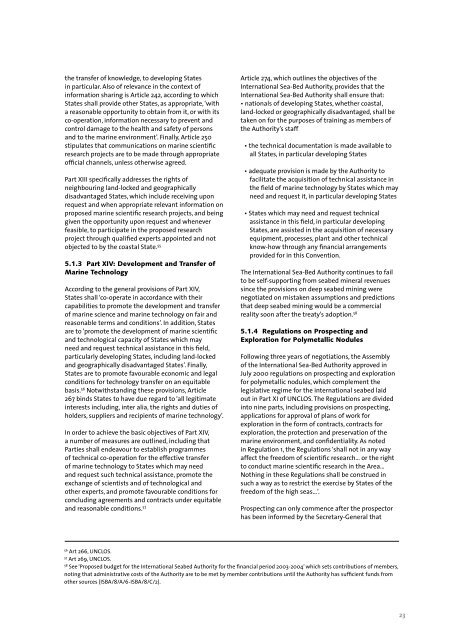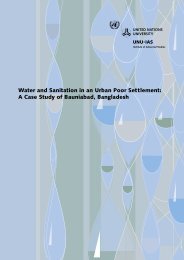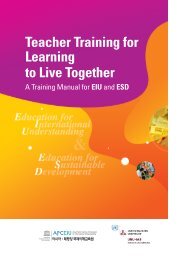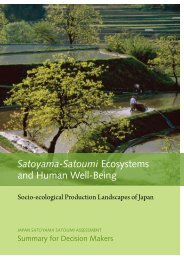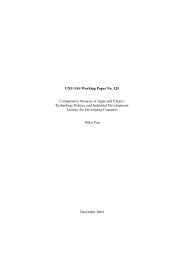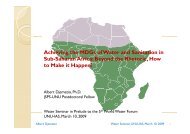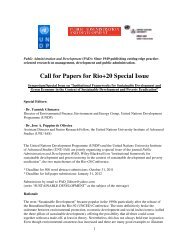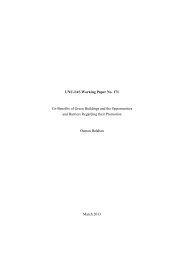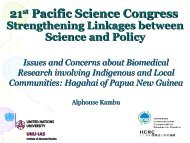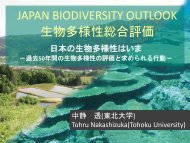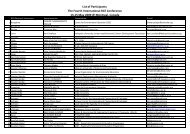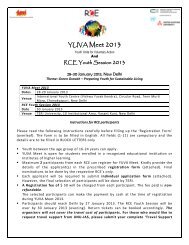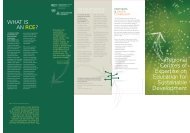Bioprospecting in Antarctica - UNU-IAS - United Nations University
Bioprospecting in Antarctica - UNU-IAS - United Nations University
Bioprospecting in Antarctica - UNU-IAS - United Nations University
Create successful ePaper yourself
Turn your PDF publications into a flip-book with our unique Google optimized e-Paper software.
the transfer of knowledge, to develop<strong>in</strong>g States<br />
<strong>in</strong> particular. Also of relevance <strong>in</strong> the context of<br />
<strong>in</strong>formation shar<strong>in</strong>g is Article 242, accord<strong>in</strong>g to which<br />
States shall provide other States, as appropriate, ‘with<br />
a reasonable opportunity to obta<strong>in</strong> from it, or with its<br />
co-operation, <strong>in</strong>formation necessary to prevent and<br />
control damage to the health and safety of persons<br />
and to the mar<strong>in</strong>e environment’. F<strong>in</strong>ally, Article 250<br />
stipulates that communications on mar<strong>in</strong>e scientific<br />
research projects are to be made through appropriate<br />
official channels, unless otherwise agreed.<br />
Part XIII specifically addresses the rights of<br />
neighbour<strong>in</strong>g land-locked and geographically<br />
disadvantaged States, which <strong>in</strong>clude receiv<strong>in</strong>g upon<br />
request and when appropriate relevant <strong>in</strong>formation on<br />
proposed mar<strong>in</strong>e scientific research projects, and be<strong>in</strong>g<br />
given the opportunity upon request and whenever<br />
feasible, to participate <strong>in</strong> the proposed research<br />
project through qualified experts appo<strong>in</strong>ted and not<br />
objected to by the coastal State. 55<br />
5.1.3 Part XIV: Development and Transfer of<br />
Mar<strong>in</strong>e Technology<br />
Accord<strong>in</strong>g to the general provisions of Part XIV,<br />
States shall ‘co-operate <strong>in</strong> accordance with their<br />
capabilities to promote the development and transfer<br />
of mar<strong>in</strong>e science and mar<strong>in</strong>e technology on fair and<br />
reasonable terms and conditions’. In addition, States<br />
are to ‘promote the development of mar<strong>in</strong>e scientific<br />
and technological capacity of States which may<br />
need and request technical assistance <strong>in</strong> this field,<br />
particularly develop<strong>in</strong>g States, <strong>in</strong>clud<strong>in</strong>g land-locked<br />
and geographically disadvantaged States’. F<strong>in</strong>ally,<br />
States are to promote favourable economic and legal<br />
conditions for technology transfer on an equitable<br />
basis. 56 Notwithstand<strong>in</strong>g these provisions, Article<br />
267 b<strong>in</strong>ds States to have due regard to ‘all legitimate<br />
<strong>in</strong>terests <strong>in</strong>clud<strong>in</strong>g, <strong>in</strong>ter alia, the rights and duties of<br />
holders, suppliers and recipients of mar<strong>in</strong>e technology’.<br />
In order to achieve the basic objectives of Part XIV,<br />
a number of measures are outl<strong>in</strong>ed, <strong>in</strong>clud<strong>in</strong>g that<br />
Parties shall endeavour to establish programmes<br />
of technical co-operation for the effective transfer<br />
of mar<strong>in</strong>e technology to States which may need<br />
and request such technical assistance, promote the<br />
exchange of scientists and of technological and<br />
other experts, and promote favourable conditions for<br />
conclud<strong>in</strong>g agreements and contracts under equitable<br />
and reasonable conditions. 57<br />
Article 274, which outl<strong>in</strong>es the objectives of the<br />
International Sea-Bed Authority, provides that the<br />
International Sea-Bed Authority shall ensure that:<br />
• nationals of develop<strong>in</strong>g States, whether coastal,<br />
land-locked or geographically disadvantaged, shall be<br />
taken on for the purposes of tra<strong>in</strong><strong>in</strong>g as members of<br />
the Authority’s staff<br />
• the technical documentation is made available to<br />
all States, <strong>in</strong> particular develop<strong>in</strong>g States<br />
• adequate provision is made by the Authority to<br />
facilitate the acquisition of technical assistance <strong>in</strong><br />
the field of mar<strong>in</strong>e technology by States which may<br />
need and request it, <strong>in</strong> particular develop<strong>in</strong>g States<br />
• States which may need and request technical<br />
assistance <strong>in</strong> this field, <strong>in</strong> particular develop<strong>in</strong>g<br />
States, are assisted <strong>in</strong> the acquisition of necessary<br />
equipment, processes, plant and other technical<br />
know-how through any f<strong>in</strong>ancial arrangements<br />
provided for <strong>in</strong> this Convention.<br />
The International Sea-Bed Authority cont<strong>in</strong>ues to fail<br />
to be self-support<strong>in</strong>g from seabed m<strong>in</strong>eral revenues<br />
s<strong>in</strong>ce the provisions on deep seabed m<strong>in</strong><strong>in</strong>g were<br />
negotiated on mistaken assumptions and predictions<br />
that deep seabed m<strong>in</strong><strong>in</strong>g would be a commercial<br />
reality soon after the treaty’s adoption. 58<br />
5.1.4 Regulations on Prospect<strong>in</strong>g and<br />
Exploration for Polymetallic Nodules<br />
Follow<strong>in</strong>g three years of negotiations, the Assembly<br />
of the International Sea-Bed Authority approved <strong>in</strong><br />
July 2000 regulations on prospect<strong>in</strong>g and exploration<br />
for polymetallic nodules, which complement the<br />
legislative regime for the <strong>in</strong>ternational seabed laid<br />
out <strong>in</strong> Part XI of UNCLOS. The Regulations are divided<br />
<strong>in</strong>to n<strong>in</strong>e parts, <strong>in</strong>clud<strong>in</strong>g provisions on prospect<strong>in</strong>g,<br />
applications for approval of plans of work for<br />
exploration <strong>in</strong> the form of contracts, contracts for<br />
exploration, the protection and preservation of the<br />
mar<strong>in</strong>e environment, and confidentiality. As noted<br />
<strong>in</strong> Regulation 1, the Regulations ‘shall not <strong>in</strong> any way<br />
affect the freedom of scientific research… or the right<br />
to conduct mar<strong>in</strong>e scientific research <strong>in</strong> the Area…<br />
Noth<strong>in</strong>g <strong>in</strong> these Regulations shall be construed <strong>in</strong><br />
such a way as to restrict the exercise by States of the<br />
freedom of the high seas…’.<br />
Prospect<strong>in</strong>g can only commence after the prospector<br />
has been <strong>in</strong>formed by the Secretary-General that<br />
56<br />
Art 266, UNCLOS.<br />
57<br />
Art 269, UNCLOS.<br />
58<br />
See ‘Proposed budget for the International Seabed Authority for the f<strong>in</strong>ancial period 2003-2004’ which sets contributions of members,<br />
not<strong>in</strong>g that adm<strong>in</strong>istrative costs of the Authority are to be met by member contributions until the Authority has sufficient funds from<br />
other sources (ISBA/8/A/6-ISBA/8/C/2).<br />
23


